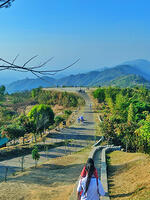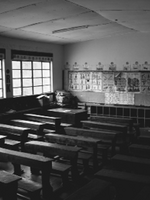Filter by...
Reset all
Publications (74)
Book Chapter
This peer-reviewed research is available free of charge. UNU-WIDER believes that research is a global public good and supports Open Access.
– What Is Missing from National Economic Recovery Plans?
From the book:
COVID-19 and the Informal Economy
Book Chapter
This peer-reviewed research is available free of charge. UNU-WIDER believes that research is a global public good and supports Open Access.
– Unpacking COVID-19 Impact on Livelihoods and Poverty in Rural Areas and Urban Low-Income Settlements of Bangladesh
From the book:
COVID-19 and the Informal Economy
Working Paper
pdf
Throughout 2021, fiscal stimulus packages were introduced to jump-start the COVID-19 ‘post-pandemic’ economic recovery process. While calls for economic recovery packages that promise to ‘build back better’ have come from many directions, the under-allocation of recovery resources directed at...
Book Chapter
This peer-reviewed research is available free of charge. UNU-WIDER believes that research is a global public good and supports Open Access.
From the book:
Tasks, Skills, and Institutions
Book Chapter
This peer-reviewed research is available free of charge. UNU-WIDER believes that research is a global public good and supports Open Access.
The challenges of structural transformation, inequality dynamics, and inclusive growth in Bangladesh
From the book:
The Developer’s Dilemma

Almost everywhere, women are underrepresented in labour markets compared to men. While labour force participation among women of working age (FLFP) has increased in recent decades, the vast majority of women in South Asia remain out of the labour market. Traditional roles and gender norms still...
Working Paper
pdf
The social and economic impact of COVID-19 has been deep, wide-ranging, and multi-dimensional. While anecdotal evidence of distress among the poor, particularly those with informal occupations, has been widespread, effective policy response has required real-time, researched data disaggregated for...
Journal Article
This peer-reviewed research is available free of charge. UNU-WIDER believes that research is a global public good and supports Open Access.
– Insights from the Hrishipara diaries
We examine the impact of the COVID-19 pandemic on the livelihoods of the poor in a semi-rural setting in Bangladesh. We use an unusually rich dataset which tracks the economic and financial transactions of sixty poor and very poor individuals and their families on a daily real-time basis for 12...

The opening keynote of the recent WIDER Development Conference, COVID-19 and development – effects and new realities for the Global South, was given by Oriana Bandiera, Sir Anthony Atkinson Professor of Economics at the London School of Economics, an accomplished economist with several awards under...

The Hrishipara Daily Diaries Project has been tracking the daily spending of 60 poor households in rural Bangladesh for the last six years. Analysis of the data collected – especially the changes to spending patterns that have occurred during the pandemic – reveals four areas where policymakers...
Working Paper
pdf
– A mixed-methods analysis of gender and labour market segmentation in Bangladesh
Data on female labour force participation in Bangladesh suggest that, despite the increase in female-intensive employment opportunities through microfinance, export garment manufacturing, and community-based services, the majority of working women are concentrated in home-based activities. There...
Working Paper
pdf
– Insights from the Hrishipara diaries
In this paper, we examine the economic impact of the COVID-19 pandemic on the livelihoods of the poor. We use an unusually rich data set from a ‘financial diaries’ study known as the Hrishipara Daily Diaries Project. The data set tracks the economic and financial transactions of 60 individuals and...
Working Paper
pdf
Although microfinance started as a movement to improve women’s economic well-being through increased female entrepreneurship in particular, its impact on women’s attitudes toward and participation in the labour market is not fully understood. We fill this gap by combining data on branch locations of...
Working Paper
pdf
– Evidence from Labour Force Survey data of Bangladesh
With structural changes in production coupled with technological progress, there have been shifts in modes of production and patterns of employment, with important consequences on task composition of occupations. This paper has utilized different rounds of Labour Force Survey data of Bangladesh and...
Working Paper
pdf
Using detailed microdata, we document how migration-dependent households are especially vulnerable during the COVID-19 pandemic. We create pre- and post-COVID panel datasets for three populations in Bangladesh and Nepal, leveraging experimental and observational variation in prior migration...

With the first confirmed case of COVID-19 in Bangladesh on 8 March 2020 and the initiation of a lockdown on 26 March 2020,1 the livelihoods of a significant number of people were under serious threat — with women most likely to suffer the worst impacts for a variety of reasons. First, women...
Working Paper
pdf
The Bangladesh economy has undergone significant structural changes over the last four decades. The share of agriculture in GDP has declined, while the significance of industry and service sectors has increased. These structural changes have been associated with persistent challenges such as lack of...
Journal Article
– Evidence from Chittagon Hill tracts of Bangladesh
We evaluate a development programme with an important maternal health care component in the Chittagong Hill Tracts of Bangladesh. The region and its mostly indigenous people experienced violent conflict in the past and face a constant risk of recurring conflict. Given this fragile setting, our work...
Working Paper
pdf
– The role of infrastructure development and gender norms
Traditional gender norms can restrict independent migration by women, preventing them from taking advantage of economic opportunities in urban non-agricultural industries. However, women may be able to circumvent such restrictions by using marriage to engage in long-distance migration—if they are...
Journal Special Issue
This peer-reviewed research is available free of charge. UNU-WIDER believes that research is a global public good and supports Open Access.
Building knowledge about migration governance and policy in the Global South is a priority for research and policy. The studies in this special section offer both new empirical insights and new frameworks for analysis, with key policy implications, that can enrich our discussion of these topics...
Journal Article
This peer-reviewed research is available free of charge. UNU-WIDER believes that research is a global public good and supports Open Access.
– Examples from South Africa, Singapore and Bangladesh
Part of Journal Special Issue
Migration Governance and Policy in the Global South
Journal Article
– Evidence from Bangladesh
We use a recent first-hand linked employer–employee survey covering the formal sector of Bangladesh to explain gender wage gaps by the inclusion of measures of cognitive attainment and personality traits. Our results show that cognitive skills have greater explanatory power than personality traits...
Working Paper
pdf
– Evidence from Bangladesh
We use a recent first-hand linked employer-employee survey covering the formal sector of Bangladesh to explain gender wage gaps by the inclusion of measures of cognitive attainment and personality traits. Our results show that cognitive skills have greater explanatory power than personality traits...
Working Paper
pdf
– Examples from South Africa, Singapore, and Bangladesh
In this paper we consider four factors that shaped the development of migration policy intended to protect the rights of vulnerable migrant women. They are: the role players in the policy change process, the debates that shaped the policy change, the role that research played and the political...
Working Paper
pdf
– Rethinking our approach to the world’s most fragile states
Those fragile states whose stagnation is so tenacious despite generous aid programs, and substantial and costly interventions, are stuck in a ‘fragility trap.’ Caught in a low-level equilibrium, trapped states appear to be in a perpetual political and economic limbo that can last for years and in...
Journal Article
This peer-reviewed research is available free of charge. UNU-WIDER believes that research is a global public good and supports Open Access.
Part of Journal Special Issue
Measuring quality of care
Working Paper
pdf
Methods: In 2010–2014, we used a situational analysis tool to collect data at district and regional hospitals in Bangladesh (n = 14), the Plurinational State of Bolivia (n = 18), Ethiopia (n = 19), Guatemala (n = 20), the Lao People’s Democratic Republic (n = 12), Liberia (n = 12) and Rwanda (n = 25...
Working Paper
pdf
– Evidence from Bangladesh
There are many studies on the effects of conditional cash transfer programmes on enrolment, productivity and poverty reduction but very few on causal effects on ages at marriage and first birth. And none of them considers the convergence effect. This paper provides new evidence on effects of the...
Working Paper
pdf
We evaluate the effectiveness of a post-conflict development programme on maternal health-care utilization in the Chittagong Hill Tracts of Bangladesh. Our work varies from conventional impact evaluation studies because of the inclusion of two post-conflict psychosocial risks: the household’s actual...
Research Brief
pdf
Global food price hikes during 2007-08 resulted in a sharp rise in staple food prices in Bangladesh, which in turn led to a significant rise in the number of households falling below the poverty line. On the political front, Bangladesh was run by an unelected and undemocratic ‘civil’ caretaker...
Research Brief
pdf
Aid projects that specifically target women tend be better at increasing gender equality than those that mainstream gender. The gender gap can be narrowed through public works that focus on providing decent employment for women as well as training and micro-finance for female entrepreneurs. The lack...
Journal Article
– Bangladesh and Pakistan since 1971
Part of Journal Special Issue
Aid and Institution-Building in Fragile States
Book Chapter
From the book:
Food Price Policy in an Era of Market Instability
Blog
Carl-Gustav Lindén Bangladesh has made some remarkable strides in development and poverty reduction since independence, despite generally weak governance. This ‘Bangladesh paradox’ has been discussed by UNU-WIDER Research Associate Lucy Scott, now at ODI (see part one and Part of the Bangladesh...
Working Paper
pdf
– Implications for Patron-Client Relationships in the Context of Bangladesh’s Agricultural Reformation
This paper investigates how a development intervention which targets extremely poor households with investment capital influences relationships between those households and the landowning elite. It places this investigation in the context of the ‘agricultural reformation’ of rural Bangladesh...
Working Paper
pdf
– Bangladesh and Pakistan Since 1971
Bangladesh and Pakistan had very divergent experiences with aid after 1971. Politics in Pakistan was less inclusive in terms of opportunities for intermediate class political entrepreneurs. In this context, the significant role of military aid to Pakistan had very negative effects on its political...
Blog
Tony Addison As the snow continues to lie deep across Helsinki, UNU-WIDER is putting the last touches to the ReCom results meeting on ‘aid and the social sectors’, which takes place at Sida in Stockholm on 13 March. Do join us if you are in Stockholm or via the video cast. Further details and how to...
Working Paper
pdf
We analyse rural household livelihood and children’s school enrollment decisions in a post-conflict setting in the Chittagong Hill Tracts region of Bangladesh. The innovation of the paper lies in the fact that we employ information about current subjective perceptions regarding the possibility of...
Working Paper
pdf
– the Case of Bangladesh
Global food price hikes during 2007 and 2008 resulted in a sharp rise in staple food prices in Bangladesh. The poor and marginalized households were particularly vulnerable to such an adverse situation as their real purchasing power eroded. Several studies indicated that the adverse effects of the...
Blog
Tony Addison This year has rushed by at speed. For UNU-WIDER it’s been a year of big successes. We will have published some 110 working papers by the end of December, up from 96 in 2011 (go here for the latest list). Recent working papers cover the topics of intergenerational mobility in India, food...
Blog
– Can Microcredit Close the Deal?
M.G. Quibria In the wake of the worst famine of Bangladesh of the post-World War era Professor Muhammad Yunus launched a microcredit experiment in 1976 to assist a group of poor, highly indebted households, in Chittagong, Bangladesh. This experiment, which was to later emerge as the Grameen Bank...
Journal Article
Part of Journal Special Issue
Climate Change and Economic Development

The roots of development economics lie in the study of large-scale phenomena such as economic transformation. Climate change, as a global phenomenon, is drawing the attention of the profession back towards studies of transformational processes, including new considerations of adaptation and low...
Blog
Tony Addison With this issue, Angle returns refreshed from its Nordic summer break. The sun continues to shine on the Baltic, although it is getting noticeably chillier as we now head into the autumn. To keep our spirits up we have a very active programme of events for the rest of the year. This...
Blog
Tony Addison Finland traditionally celebrates the start of summer on 1st May (the ‘Vappu’ holiday), and UNU-WIDER currently basks in warm sunshine. At this point in the year the daylight lasts for 18 hours, with everyone taking advantage of the long, light evenings. In winter, the shortest days see...
Blog
– Progressing On One without the Other?
Lucy Scott Women are increasingly seen as an important part of the international development agenda. Empowering women and promoting gender equality are enshrined as global development objectives with the Millennium Development Goals (MDGs) agreed in 2000. Despite empowering women widely being viewed...
Book Chapter
From the book:
The Role of Elites in Economic Development
Blog
Tony Addison January saw the snow arrive in Helsinki. As I look out across the harbour, the scene is one of various shades of white and grey. The temperature is well below zero (minus 20oc). But we are now gaining light, having past the shortest day of the year in December. Our mood also brightened...
Research Brief
– Progressing on One Without the Other?
Women are increasingly seen as an important part of the international development agenda. Empowering women and promoting gender equality are enshrined as global development objectives with the Millennium Development Goals (MDGs) agreed in 2000. Despite empowering women widely being viewed as a ‘good...
Working Paper
pdf
– Women’s Economic and Social Empowerment, Insights from the Transfer of Material Assets in Bangladesh
This article examines the relationship between women’s economic and social empowerment in the context of extreme poverty. It is based on the findings of primary fieldwork on the char islands of north-west Bangladesh, investigating the processes resulting from the implementation of the Chars...
Blog
– Bangladesh Achieving Middle-Income Status (Part 2)
Lucy Scott Part 1 of this article, which appeared in last month’s issue, discussed the ‘Bangladesh Paradox’ that Bangladesh has made economic and social strides forwards despite having weak governance. For Bangladesh to achieve its goal of middle-income country status by 2021 governance will have to...
Working Paper
pdf
Climate change assessments often inadequately address uncertainty when estimating damages. Using a dynamic economy-wide model of Bangladesh, we estimate and decompose damages from historical climate variability and future anthropogenic climate change. Our stochastic simulation approach avoids biases...
Blog
– The Success of Bangladesh so Far (Part I)
Lucy Scott Bangladesh has made some remarkable strides in development and poverty reduction since independence. Yet the country is in many ways a paradox of success combined with often weak governance. This two-part article explores the paradox. Part 2 will appear in the next issue of Angle. In 1975...
Journal Article
– Evidence from the Chittagong Hill Tracts in Bangladesh
Part of Journal Special Issue
Small Business, Entrepreneurship, and Violent Conflict in Developing Countries
Working Paper
pdf
Community-based development has been criticized for its inadequate understanding of power relationships at the local level, which thus leaves room for elite capture. This paper compares and contrasts two case studies, both of which take power seriously in their institutional designs. The solar home...
Blog
Alice Amsden, Alisa DiCaprio, and James Robinson To understand what role elites play in the process of economic development, we need to establish first who they are. Though most definitions are welfare neutral, in popular discourse elites take on a negative connotation. This conceptual confusion has...
Working Paper
pdf
– Its Determinants and Implications for Gender Resource Allocation
Using data from a survey of Bangladeshi households, this paper explores the determinants of domestic violence against women as well as its implications for the resources allocated to women. The findings reveal that higher education of women and that of their husbands, and better socioeconomic status...
Working Paper
pdf
Using data from a survey of Bangladeshi households, this paper investigates the link between female status and food security. Employing three different indicators of female status – husband’s and wife’s assets brought at marriage, female share of household income and a composite index of women...
Working Paper
pdf
Over the course of the last decade, Bangladesh has implemented a broad-based program of financial and market reforms, encompassing changes in the structure of the financial system, prudential and supervisory frameworks, and monetary management. This paper estimates a savings function to evaluate the...
Working Paper
pdf
This paper examines the financial sector reform experience of Bangladesh. It finds that while there have been some improvements in competition and efficiency, loan defaults still remain a significant problem. It also finds urban bias in loan allocation and shift of resources away from the rural...

– A Study of Human Capabilities
Women, a majority of the world's population, receive only a small proportion of its opportunities and benefits. According to the 1993 UN Human Development Report, there is no country in the world in which women's quality of life is equal to that of men. This examination of women's quality of life...
Book Chapter
From the book:
The Political Economy of Hunger
Book Chapter
– Women's Right to Employment in India and Bangladesh
From the book:
Women, Culture, and Development
Displaying 64 of 74 results
 Join the network
Join the network